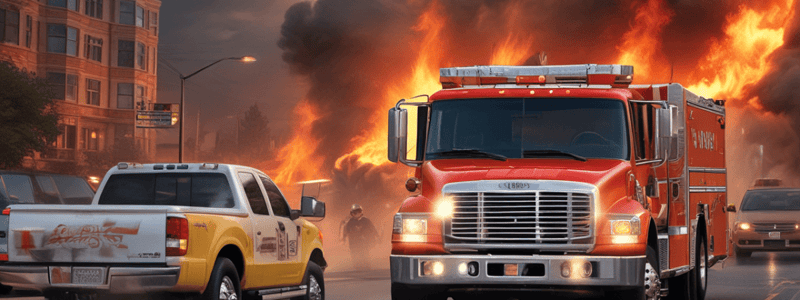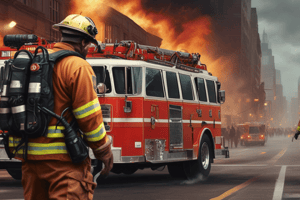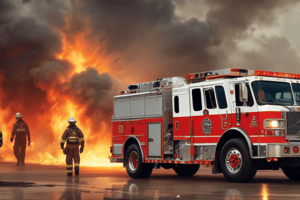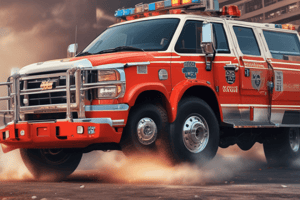Podcast
Questions and Answers
What is procedure when responding to a Non-Emergency event?
What is procedure when responding to a Non-Emergency event?
- Turn off the vehicle's radio
- Use lights and sirens
- Respond in compliance with the Highway Traffic Act (correct)
- Exceed the speed limit to arrive quickly
What type of event requires a Non-Emergency response?
What type of event requires a Non-Emergency response?
- Medical emergency with life-threatening injuries
- Report of carbon monoxide with no medical symptoms (correct)
- Fire in a residential building
- Vehicle accident with multiple injuries
What is the procedure when responding to a Carbon Monoxide Event?
What is the procedure when responding to a Carbon Monoxide Event?
- Advise the caller to open windows and doors for ventilation
- Enter the house to take readings immediately
- Tell the caller to stay inside until help arrives
- Advise the caller to leave the house/apartment to wait outside (correct)
What type of request from TEMS would initiate a Medical Assist Event?
What type of request from TEMS would initiate a Medical Assist Event?
Under what circumstances would a lift assist request be dispatched?
Under what circumstances would a lift assist request be dispatched?
What is the role of TFS Communications Centre personnel?
What is the role of TFS Communications Centre personnel?
How does a dispatcher indicate a Non-Emergency event at the time of dispatch?
How does a dispatcher indicate a Non-Emergency event at the time of dispatch?
What is the weight threshold for lift assist requests?
What is the weight threshold for lift assist requests?
Flashcards are hidden until you start studying
Study Notes
General Guidelines
- When responding to a Non-Emergency event, TFS crews should not use lights/sirens and must comply with the Highway Traffic Act.
- Response to a Non-Emergency event should not affect travel time or delay the crew from leaving the station.
- TFS dispatchers must verbally indicate that the response is Non-Emergency at the time of dispatch.
- TFS Communications Centre personnel are authorized to redirect TFS apparatus responding to a Non-Emergency event to an Emergency event.
Carbon Monoxide Event (CONMNE)
- A Non-Emergency response to the report of carbon monoxide with no medical symptoms.
- The caller must be able to leave the house/apartment to wait outside.
- All residents, including pets, must be accounted for.
- The caller will be advised to leave windows and doors closed to allow for readings to be taken when TFS arrives.
Medical Assist Event (MEANE)
- A response initiated by a request from TEMS where no medical emergency has been reported.
- TFS is required for a lift assist or an access problem.
- All requests for lift assists from TEMS will be reported to the TFS Communications Centre verbally, by telephone.
- Responses for lift assists originating from TEMS will only be dispatched under certain circumstances:
- Life-threatening situations.
- Patients of significant weight (i.e., in excess of 115 kg or 250 lbs).
- Request for assistance when TEMS resources are not available, and they have advised that there will be a lengthy delay in assisting the patient.
Check Call (CCNE)
- A Non-Emergency response for the report of a lock-out / lock-in, where the call taker has confirmed that there are no life-threatening or psychological conditions.
- The response may include a District Chief responding to a report of overcrowding or a fire hazard.
Vehicle Spill Clean-Up (VESCNE)
- A Non-Emergency response to clean up a spill where another public safety agency is on scene, the spilled material/liquid has been identified, and there is no hazard or environmental impact.
- "Vehicle – Washdown Highway" has been renamed "Vehicle – Spill Clean-Up Highway".
- All highway events remain Emergency responses.
Studying That Suits You
Use AI to generate personalized quizzes and flashcards to suit your learning preferences.




